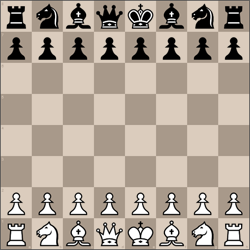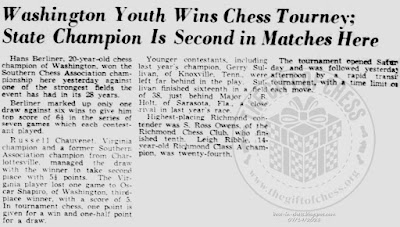Back to Home Index
July 03 1949
Richmond Times-Dispatch, Richmond, Virginia, Sunday July 03, 1949
Washington's Hans Berliner (left) Tests Southern Chess Champ Gerry Sullivan
Kit Crittenden, North Carolina Champ, Nester Hernandez Watch Tournament Play—Staff Photo
Richmond Times-Dispatch, Richmond, Virginia, Sunday, July 03, 1949
Teen-Age Champs Spotlighted As Chess Tourney Opens Here
By John Wessells
The conception that a double-domed cranium and the patience of Job are essential accessories for a chess player is taking a beating this week end at the Southern Chess Association's annual tournament here.
Thirty-eight average Americans turned up at Hotel John Marshall yesterday to spend the holidays playing the ancient game. The accent was on teen-agers.
Defending his association title was 18-year-old Gerry Sullivan from Knoxville Tenn., who just completed his sophomore year at th University of Tennessee.
Another sport-shirted champ was Kit Crittenden, 15, who licked a college professor for top honors in North Carolina. Leigh Ribble, Jr., Class A champ of the Richmond Chess Club, at 14 is a strong contender.
Youngsters Strongest
“The strongest players are youngsters just like any sport,” according to J. L. Harrington, a retired executive and lifelong chess devotee. “One of our two American grand masters Sam Rescheveski, toured the country as a prodigy before he was 10.
The group paired off in the roof garden competition, most of them under 21, make up the strongest tournament in years in Harrington's judgment, “The only trouble is that the association had us use the 'Swiss System,' with a time limit on the game” he pointed out.
“In Russia chess is a national game like baseball but over here the players can't even get off work for a national tournament,” Harrington sighed.
In order to get through by Tuesday, each player is limited to two and one-half hours for 50 moves, or an average of three minutes per move, win lose or draw. You get to time your opponent by means of a chess clock, two stop watches mounted together. Push a lever and his clock starts ticking while he thinks. He stops his and starts yours when he moves.
At two games per player per day, that comes out 10 hours of chess daily, but nobody appeared to be getting excited about it. There were some knotted brows among the nonrated players, but most of them wandered around kibitzing or huddled around the ice-water pitcher between moves.
Over-the-shoulder chess is standard procedure, as long as you don't offer any advice. One middle-aged couple attend tournaments together regularly but never play. Tournament chess players can concentrate the kibitzer right out of the picture.
“I used to set up my correspondence games right next to the radio” Harrington said “First thing you know I would come to and Bing Crosby would be over without me hearing a note. Made me so darn mad!”
You can get up a good argument in chess circles over where the game originated. Etchings on the pyramids of Egypt attest that the game was played centuries before Christ but the only agreement seems to he that it was thought up in the East somewhere.
Slightly Complex
Six different types of make it a little complicated but nothing that the man in the street can't tackle, according to C. S. Boggess, another Richmond contestant.
“People think you need an oversize brain to figure the whole game out in advance.” Boggess said, “but even the masters seldom think more than two or three moves in advance. They can't, because they know what the other fellow's going to do.”
Chess is a lot more fun the way they play it in a local department store during lunch hour, according to Boggess. They toss out the books on precise chess and have good name-calling time.
“Only one thing wrong with this tournament,” Boggess said. “They ought to give everybody a 20-minute time limit. Then we could get through with this thing and go home.”
July 04 1949
The Richmond News Leader, Richmond, Virginia, Monday, July 04, 1949
PROXY DECISION—Hans Berliner (left), Washington chess champion, makes a move in a match against Stuart Wagman (right), also of Washington, to determine the winner of a match in the all-Southern tournament here. The two are “adjudicating” a match between Major J. B. Holt, of Long Beach, Fla., and Steven Shaw, of Miami, under the Swiss tournament system because they failed to complete their games in five hours. The “proxy” winner was Shaw. Kibitzing are Kit Crittenden, 15, North Carolina champion, and Carl Burger, 16, of New York.

Questions Fly As Champs Vie For Chess Title
By William Bien
“Do you like the Nimzo-Indian defence to the Queen's Gambit declined?”
“Or do you prefer the fried liver variation in the Two Knights defense?”
Those are common questions being tossed around at random at the Southern Chess Association's annual convention meeting at the Hotel John Marshall.
While ordinary folks are cooling themselves in various vacation spots, 38 chess experts are sweating out the 1949 chess championship, trying to beat 18-year-old Gerry Sullivan, defending champion from Knoxville, Tenn.
ANOTHER THREATENS
One of the top contenders for the crown in another teen-ager, Kit Crittenden, 15, of Raleigh, N.C. He is the son of the director of the archives and history department for the State of North Carolina.
Just recently Crittenden upset several old-timers to win the Tennessee Open, but this is his first really “major-league” test.
Another player to be reckoned with is young Leigh Ribble, Jr., 14, who is Class “A” champ of the Richmond Chess Club.
Martin Southern, president of the Southern Chess Association, says this is the strongest group ever entered in an SCA tourney, despite the fact that a majority of the players are under 21.
Only one woman is entered in the championship play. She is a Richmond housewife, Mrs. Willa White, who also is president of the Richmond Chess Club.
FAST GAME NOW
These tournament players knocked into a cocked hat the outdated idea that chess is a game for people with nothing else to do. They play the game fast nowadays, under the Swiss system used at this tournament. According to the rules each player must make a minimum of 40 moves in the first two hours.
“A game will normally be won in 35 to 55 moves,” says Southern, “but sometimes it takes as many as 100 or more.”
At any rate, the contenders are putting in a full 10-hour day every day of the tournament, scheduled to end tomorrow morning. Tomorrow, that is, unless too many games bog down after the first 100 moves!
Tomorrow afternoon, the various winners will receive trophies, provided by Miller & Rhoads, or cash awards, taken from the $3 entry fee each player must pay to enter.
July 06 1949
Richmond Times-Dispatch, Richmond, Virginia, Wednesday, July 06, 1949
Washington Youth Wins Chess Tourney of State Champion Is Second in Matches Here
Hans Berliner 20-year-old chess champion of Washington, won the Southern Chess Association championship here yesterday against one of the strongest fields the event has had in its 28 years.
Berliner marked up only one draw against six wins to give him top score of 6½ in the series of seven games which each contestant played.
Russell Chauvenet, Virginia champion and a former Southern Association champion from Charlottesville, managed the draw with the winner to take second place with 5½ points. The Virginia player lost one game to Oscar Shapiro, of Washington, third-place winner, with a score of 5. In tournament chess, one point is given for a win and one-half point for a draw.
Younger contestants, including last year's champion, Gerry Sullivan, of Knoxville, Tenn., were left far behind in the play. Sullivan finished sixteenth in a field of 38, just behind Major J. B. Holt, of Sarasota, Fla., a close rival in last year's race.
Highest-placing Richmond contender was S. Ross Owens, of the Richmond Chess Club, who finished tenth. Leigh Ribble, 14-year-old Richmond Class A champion, was twenty-fourth.
The tournament opened Saturday and was followed yesterday afternoon by a rapid transit tournament, with a time limit on each move.
August 28 1949
Democrat and Chronicle, Rochester, New York, Sunday, August 28, 1949
The Champ Shows How
Larry Evans of New York City, left, who is defending his state chess championship, explains move to Dr. Edward Lasker, New York; Hans Berliner, Washington, D. C., champion; Paul Morgan, Rochester champ, in discussion at opening of state tourney here.

State's Chess Masters Battle It Out
It was so quiet in the Kodak Park recreation hall yesterday you could hear a pawn drop.
With dual-controlled clocks beside them, nearly 50 of the world's top notch chess players huddled in deep concentration over the checkered boards, hoping to capture not only their opponents' kings, but the title of New York State chess champion.
The 1949 State Chess Association Congress tournament, which opened yesterday noon, will continue until Sept. 5. Adhering to the Swiss tourney style, the winners of yesterday's matches will vie against each other today, with play continuing on the same basis tomorrow.
According to tournament rules, each player is required to make 40 moves in a two-hour period. After that, 20 moves must be made each hour. A time clock supplied each couple records the time taken for each play, and adds an element of suspense of the game.
One of yesterday's most interesting matches was between 17-year-old Larry Evans, state champion, and Dr. Edward Lasker, international master. Both are of New York City. At another table was Louis Persinger, violin instructor at Julliard School of Music and teacher of several noted concert artists, including Yehudi Menuhin. Other players competing in the tournament are Hans Berliner, young champion of Washington, D. C.; Donald Byrne, Yale University student, and George Kramer, international star, who copped the state championship title when he was only 14.
Four of the six Rochesterians playing in yesterday's tourney won their matches. Dr. Herzberger defeated an internationally-known expert, A. E. Santasiere of New York, while victories were also netted by E. W. Marchand, W. A. Wagner and Paul Morgan, local champ.
August 29 1949
 6 Move to Front Rank in Chess Tourney 29 Aug 1949, Mon Democrat and Chronicle (Rochester, New York) Newspapers.com
6 Move to Front Rank in Chess Tourney 29 Aug 1949, Mon Democrat and Chronicle (Rochester, New York) Newspapers.com
















































